
The National is the national art gallery of Scotland. It is located on The Mound in central Edinburgh, close to Princes Street. The building was designed in a neoclassical style by William Henry Playfair, and first opened to the public in 1859.

Visual art of the United States or American art is visual art made in the United States or by U.S. artists. Before colonization, there were many flourishing traditions of Native American art, and where the Spanish colonized Spanish Colonial architecture and the accompanying styles in other media were quickly in place. Early colonial art on the East Coast initially relied on artists from Europe, with John White the earliest example. In the late 18th and early 19th centuries, artists primarily painted portraits, and some landscapes in a style based mainly on English painting. Furniture-makers imitating English styles and similar craftsmen were also established in the major cities, but in the English colonies, locally made pottery remained resolutely utilitarian until the 19th century, with fancy products imported.

The National Gallery of Art is an art museum in Washington, D.C., United States, located on the National Mall, between 3rd and 9th Streets, at Constitution Avenue NW. Open to the public and free of charge, the museum was privately established in 1937 for the American people by a joint resolution of the United States Congress. Andrew W. Mellon donated a substantial art collection and funds for construction. The core collection includes major works of art donated by Paul Mellon, Ailsa Mellon Bruce, Lessing J. Rosenwald, Samuel Henry Kress, Rush Harrison Kress, Peter Arrell Browne Widener, Joseph E. Widener, and Chester Dale. The Gallery's collection of paintings, drawings, prints, photographs, sculpture, medals, and decorative arts traces the development of Western art from the Middle Ages to the present, including the only painting by Leonardo da Vinci in the Americas and the largest mobile created by Alexander Calder.
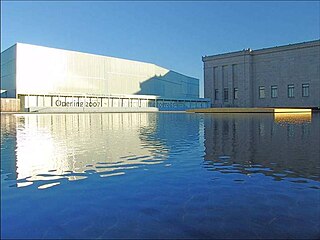
The Nelson-Atkins Museum of Art is an art museum in Kansas City, Missouri, known for its encyclopedic collection of art from nearly every continent and culture, and especially for its extensive collection of Asian art.
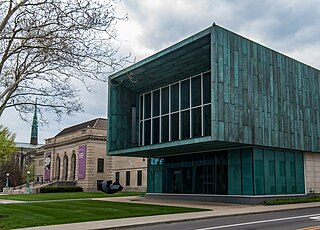
The Columbus Museum of Art (CMA) is an art museum in downtown Columbus, Ohio. Formed in 1878 as the Columbus Gallery of Fine Arts, it was the first art museum to register its charter with the state of Ohio. The museum collects and exhibits American and European modern and contemporary art, folk art, glass art, and photography. The museum has been led by Executive Director Brooke Minto since 2023.

Albert Pinkham Ryder was an American painter best known for his poetic and moody allegorical works and seascapes, as well as his eccentric personality. While his art shared an emphasis on subtle variations of color with tonalist works of the time, it was unique for accentuating form in a way that some art historians regard as a precursor to modernism.

Charles Allan Grafly, Jr. was an American sculptor, and teacher. Instructor of Sculpture at the Pennsylvania Academy of the Fine Arts for 37 years, his students included Paul Manship, Albin Polasek, and Walker Hancock.

The Pennsylvania Academy of the Fine Arts (PAFA) is a museum and private art school in Philadelphia, Pennsylvania. It was founded in 1805 and is the first and oldest art museum and art school in the United States.

Tonalism was an artistic style that emerged in the 1880s when American artists began to paint landscape forms with an overall tone of colored atmosphere or mist. Between 1880 and 1915, dark, neutral hues such as gray, brown or blue, often dominated compositions by artists associated with the style. During the late 1890s, American art critics began to use the term "tonal" to describe these works, as well as the lesser-known synonyms Quietism and Intimism. Two of the leading associated painters were George Inness and James McNeill Whistler.
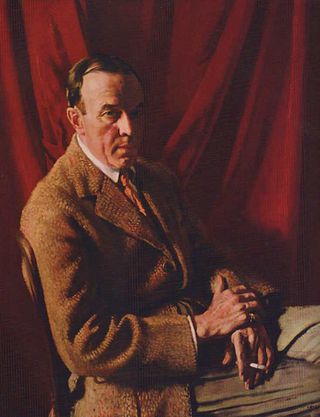
Stephen Carlton Clark was an American art collector, businessman, newspaper publisher and philanthropist. He founded the Baseball Hall of Fame in Cooperstown, New York.

Crystal Bridges Museum of American Art is a museum of American art in Bentonville, Arkansas. The museum, founded by Alice Walton and designed by Moshe Safdie, officially opened on 11 November 2011. It offers free public admission.

Edward Larrabee Barnes was an American architect. His work was characterized by the "fusing [of] Modernism with vernacular architecture and understated design." Barnes was best known for his adherence to strict geometry, simple monolithic shapes and attention to material detail. Among his best-known projects are the Haystack School, Christian Theological Seminary, Dallas Museum of Art, the Walker Art Center, 599 Lexington Avenue, the Thurgood Marshall Federal Judiciary Building, and the IBM Building at 590 Madison Avenue.

The Taubman Museum of Art, formerly the Art Museum of Western Virginia, is an art museum in downtown Roanoke, Virginia, United States. Formally established in 1951, the museum was housed in several locations around Roanoke before moving in 2008 to its current home, a contemporary architecture building designed by Randall Stout. The museum specializes in American art, and provides free general admission daily.
Lloyd Goodrich was an American art historian. He wrote extensively on American artists, including Edward Hopper, Thomas Eakins, Winslow Homer, Raphael Soyer and Reginald Marsh. He was associated with the Whitney Museum of American Art in New York City for many years.

Duncan Phillips was a Washington, D.C., based art collector and critic who played a seminal role in introducing modern art to America.

Kenneth Hayes Miller was an American painter, printmaker, and teacher.
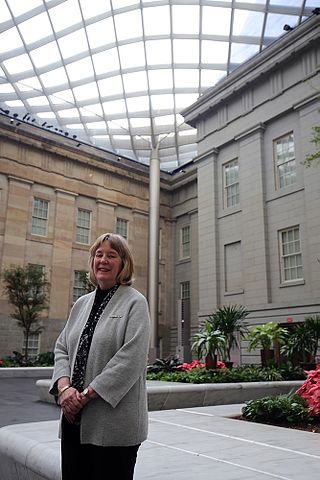
Elizabeth "Betsy" Broun is an American art historian and curator. Broun served as the Margaret and Terry Stent Director of the Smithsonian American Art Museum from 1989 to 2016, and is the longest-serving female director in the history of the Smithsonian Institution.
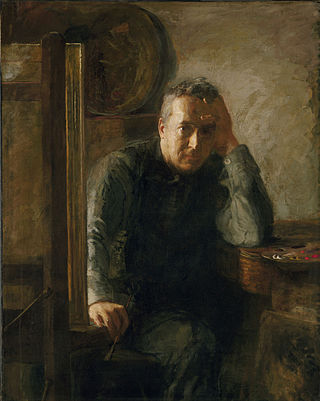
Charles Bregler was an American portrait painter and sculptor, and a student of artist Thomas Eakins. Bregler wrote about Eakins's teaching methods, and amassed a large collection of his minor works, memorabilia and papers. Following Bregler's death, his widow safeguarded the Eakins collection for decades before selling it to the Pennsylvania Academy of the Fine Arts.

Bruno Louis Zimm was an American sculptor. He created a variety of works: fountains, memorials, freestanding sculptures, and architectural sculptures.




























